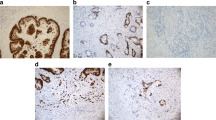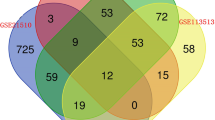Abstract—
The expression of potential prognostic markers of human colon adenocarcinoma in tumor and adjacent normal tissue, as well as the relationship between their expression levels was studied. The expression of potential prognostic markers (IGFBP3, AhR, CYP1A1, CYP1B1, HIF-1α, OCT4A, OCT4B, OCT4B1) was assayed with quantitative RT-PCR (qPCR). A correlation between IGFBP3 and AhR expression was found. AhR signaling was analyzed in the primary culture of human colon adenocarcinoma BSK 8 with IGFBP3 gene knockout. It was found that the enhanced expression of AhR can be an additional diagnostic criterion for colon cancer. The correlation between the expression level of HIF-1α, IGFPB3, and OCT4 isoforms and clinic stage (TNM) was not estimated. Clones with IGFBP3 gene knockout had augmented doubling time and increased resistance to the cytostatic drug 5-ftoruracile after modulated activity of dioxin receptor with its agonist—indol-3-carbinol.









Similar content being viewed by others
REFERENCES
Ambrosetti, D., Dufies, M., Dadone, B., Durand, M., Borchiellini, D., Amiel, J., Pouyssegur, J., Rioux-Leclercq, N., Pages, G., Burel-Vandenbos, F., and Mazure, N.M., The two glycolytic markers GLUT1 and MCT1 correlate with tumor grade and survival in clear-cell renal cell carcinoma, PLoS One, 2018, vol. 13.
Asadi, M.H., Mowla, S.J., Fathi, F., Aleyasin, A., Asadzadeh, J., and Atlasi, Y., OCT4B1, a novel spliced variant of OCT4, is highly expressed in gastric cancer and acts as an antiapoptotic factor, Int. J. Cancer, 2011, vol. 128, pp. 2645–2652.
Asadi, M.H., Khalifeh, K., and E, Mowla, S.J., OCT4 spliced variants are highly expressed in brain cancer tissues and inhibition of OCT4B1 causes G2/M arrest in brain cancer cells, J. Neurooncol., 2016, vol. 130, pp. 455–463.
Asadzadeh, J., Asadi, M.H., Shakhssalim, N., Rafiee, M.R., Kalhor, H.R., Tavallaei, M., and Mowla, S.J., A plausible anti-apoptotic role of up-regulated OCT4B1 in bladder tumors, Urol. J., 2012, vol. 9, pp. 574–580.
Atlasi, Y., Mowla, S.J., Ziaee, S.A., Gokhale, P.J., and Andrews, P.W., OCT4 spliced variants are differentially expressed in human pluripotent and nonpluripotent cells, Stem Cells, 2008, vol. 26, pp. 3068–3074.
Baba, Y., Nosho, K., Shima, K., Irahara, N., Chan, A.T., Meyerhardt, J.A., Chung, D.C., Giovannucci, E.L., Fuchs, C.S., and Ogino, S., HIF1A overexpression is associated with poor prognosis in a cohort of 731 colorectal cancers, Am. J. Pathol., 2010, vol. 176, pp. 2292–2301.
Bock, K.W. and Köhle, C., Ah Receptor- and TCDD-mediated liver tumor promotion: clonal selection and expansion of cells evading growth arrest and apoptosis, Biochem. Pharmacol., 2005, vol. 69, pp. 1403–1408.
Chan, Y.X., Alfonso, H., Paul, Chubb, S.A., Ho, K.Y., Gerard, Fegan, P., Hankey, G.J., Golledge, J., Flicker, L., and Yeap, B.B., Higher IGFBP3 is associated with increased incidence of colorectal cancer in older men independently of IGF1, Clin. Endocrinol. (Oxford), 2018, vol. 88, pp. 333–340.
Diry, M., Tomkiewicz, C., Koehle, C., Coumoul, X., Bock, K.W., Barouki, R., and Transy, C., Activation of the dioxin/aryl hydrocarbon receptor (AhR) modulates cell plasticity through a JNK-dependent mechanism, Oncogene, 2006, vol. 25, pp. 5570–5574.
D’Uva, G., Baci, D., Albini, A., and Noonan, D.M., Cancer chemoprevention revisited: cytochrome P450 family 1B1 as a target in the tumor and the microenvironment, Cancer Treat. Rev., 2018, vol. 63, pp. 1–18.
Furlan, D., Sahnane, N., Carnevali, I., Cerutti, R, .Bertoni, F., Kwee, I., Uccella, S., Bertolini, V., Chiaraval-li, A.M., and Capella, C., Up-regulation of the hypoxia-inducible factor-1 transcriptional pathway in colorectal carcinomas, Hum. Pathol., 2008, vol. 39, pp. 1483–1494.
Gwak, J.M., Kim, M., Kim, H.J., Jang, M.H., and Park, S.Y., Expression of embryonal stem cell transcription factors in breast cancer: Oct4 as an indicator for poor clinical outcome and tamoxifen resistance, Oncotarget, 2017, vol. 8, pp. 36 305–36 318.
Hoskin, P.J., Sibtain, A., Daley, F.M., and Wilson, G.D., GLUT1 and CAIX as intrinsic markers of hypoxia in bladder cancer: relationship with vascularity and proliferation as predictors of outcome of ARCON, Br. J. Cancer, 2003, vol. 89, pp. 1290–1297.
Ide, H., Lu, Y., Yu, J., Noguchi, T., Kanayama, M., Muto, S., Yamaguchi, R., Kawato, S., and Horie, S., Aryl hydrocarbon receptor signaling involved in the invasiveness of LNCaP cells, Hum. Cell, 2017, vol. 30, pp. 133–139.
Jez, M., Ambady, S., Kashpur, O., Grella, A., Malcuit, C., Vilner, L., Rozman, P., and Dominko, T., Expression and differentiation between OCT4A and its pseudogenes in human ESCs and differentiated adult somatic cells, PLoS One, 2014, vol. 9.
Kim, J.H., Park, M.Y., Kim, C.N., Kim, K.H., Kang, H.B., Kim, K.D., and Kim, J.W., Expression of endothelial cell-specific molecule-1 regulated by hypoxia inducible factor-1α in human colon carcinoma: impact of ESM-1 on prognosis and its correlation with clinicopathological features, Oncol. Rep., 2012, vol. 28, pp. 1701–1708.
Knerr, S., Schaefer, J., Both, S., Mally, A., Dekant, W., and Schrenk, D., 2,3,7,8-Tetrachlorodibenzo-p-dioxin induced cytochrome P450s alter the formation of reactive oxygen species in liver cells, Mol. Nutr. Food Res., 2006, vol. 50, pp. 378–384.
Koshkin, S.A., Ivanova, M.A., Timin, G.V., Rykov, I.V., Chistyakov, I.A., and Tolkunova, E.N., Increased drug resistance in cancer stem cells under the conditions of hypoxia, Vestn. Chuvash. Gos. Pedagog. Univ. im. I.Ya. Yakovleva, 2016, vol. 92, no. 4, pp. 23–33.
Kurtova, A.V., Xiao, J., Mo, Q., Pazhanisamy, S., Krasnow, R., Lerner, S.P., Chen, F., Roh, T.T., Lay, E., Ho, P.L., and Chan, K.S., Blocking PGE2-induced tumour repopulation abrogates bladder cancer chemoresistance, Nature, 2015, vol. 517, pp. 209–213.
Li, Z., Bao, S., Wu, Q., Wang, H., Eyler, C., Sathornsumetee, S., Shi, Q., Cao, Y., Lathia, J., McLendon, R.E., Hjelmeland, A.B., and Rich, J.N., Hypoxia-inducible factors regulate tumorigenic capacity of glioma stem cells, Cancer Cell, 2009, vol. 15, pp. 501–513.
Li, B., Yao, Z., Wan, Y., and Lin, D., Overexpression of OCT4 is associated with gefitinib resistance in non-small cell lung cancer, Oncotarget, 2016, vol. 7, pp. 77 342–77 347.
Liu, Z., Wu, X., Zhang, F., Han, L., Bao, G., He, X., and Xu, Z., AhR expression is increased in hepatocellular carcinoma, J. Mol. Histol., 2013, vol. 44, pp. 455–461.
Malfettone, A., Silvestris, N., Paradiso, A., Mattioli, E., Simone, G., and Mangia, A., Overexpression of nuclear NHERF1 in advanced colorectal cancer: association with hypoxic microenvironment and tumor invasive phenotype, Oncol. Rep., 2012, vol. 92, pp. 296–303.
Mathieu, J., Zhang, Z., Zhou, W., Wang, A.J., Heddleston, J.M., Pinna, C.M., Hubaud, A., Stadler, B., Choi, M., Bar, M., Tewari, M., Liu, A., Vessella, R., Rostomily, R., Born, D., Horwitz, M., Ware, C., Blau, C.A., Cleary, M.A., Rich, J.N., and Ruohola-Baker, H., HIF induces human embryonic stem cell markers in cancer cells, Cancer Res., 2011, vol. 71, pp. 4640–4652.
Mirzaei, M.R., Najafi, A., Arababadi, M.K., Asadi, M.H., and Mowla, S.J., Altered expression of apoptotic genes in response to OCT4B1 suppression in human tumor cell lines, Tumour Biol., 2014, vol. 35, pp. 9999–10 009.
Mirzaei, M.R., Mahmoodi, M., Hassanshahi, G., and Ahmadi, Z., Down-regulation of anti-apoptotic genes in tumor cell lines is facilitated by suppression of OCT4B1, Adv. Med. Sci., 2017, vol. 62, pp. 97–102.
Murray, I.A., Patterson, A.D., and Perdew, G.H., Aryl hydrocarbon receptor ligands in cancer: friend and foe, Nat. Rev. Cancer, 2014, vol. 14, pp. 801–814.
Opitz, C.A., Litzenburger, U.M., Sahm, F., Ott, M., Tritschler, I., Trump, S., Schumacher, T., Jestaedt, L., Schrenk, D., Weller, M., Jugold, M., Guillemin, G.J., Miller, C.L., Lutz, C., Radlwimmer, B., Lehmann, I., von, Deimling, A., Wick, W., and Platten, M., An endogenous tumour-promoting ligand of the human aryl hydrocarbon receptor, Nature, 2011, vol. 478, pp. 197–203.
Pankaj, J., Kumari, J.R., Kim, W., and Lee, S.A., Insulin-like growth factor-1, IGF-binding protein-3, C-peptide and colorectal cancer: a case-control study, Asian Pac. J. Cancer Prev., 2015, vol. 16, pp. 3735–3740.
Patel, S.A., Bhambra, U., Charalambous, M.P., David, R.M., Edwards, R.J., Lightfoot, T., Boobis, A.R., and Gooderham, N.J., Interleukin-6 mediated upregulation of CYP1B1 and CYP2E1 in colorectal cancer involves DNA methylation, MiR27b and STAT3, Br. J. Cancer, 2014, vol. 111, pp. 2287–2296.
Peng, T.L., Chen, J., Mao, W., Liu, X., Tao, Y., Chen, L.Z., and Chen, M.H., Potential therapeutic significance of increased expression of aryl hydrocarbon receptor in human gastric cancer, World J. Gastroenterol., 2009, vol. 15, pp. 1719–1729.
Poursani, E.M., Mohammad, Soltani, B., and Mowla, S.J., Differential expression of OCT4 pseudogenes in pluripotent and tumor cell lines, Cell J., 2016, vol. 18, pp. 28–36.
Rushmore, T.H. and Kong, A.N., Pharmacogenomics, regulation and signaling pathways of phase I and II drug metabolizing enzymes, Curr. Drug Metab., 2002, vol. 3, pp. 481–490.
Santosh, V., Arivazhagan, A., Sreekanthreddy, P., Srinivasan, H., Thota, B., Srividya, M.R.Vrinda, M., Sridevi, S., Shailaja, B.C., Samuel, C., Prasanna, K.V., Thennara-su, K., Balasubramaniam, A., Chandramouli, B.A., Hegde, A.S., Somasundaram, K., Kondaiah, P., and Rao, M.R., Grade-specific expression of insulin-like growth factor-binding proteins-2, -3, and -5 in astrocytomas: IGFBP-3 emerges as a strong predictor of survival in patients with newly diagnosed glioblastoma, Cancer Epidemiol. Biomarkers Prev., 2010, vol. 19, pp. 1399–1408.
Sheen-Chen, S.M., Zhang, H., Huang, C.C., and Tang, R.P., Insulin-like growth factor-binding protein-3 in breast cancer: analysis with tissue microarray, Anticancer Res., 2009, vol. 29, pp. 1131–1135.
da Silva, P.B., Teixeira Dos Santos, M.C., Rodini, C.O., Kaid, C., Pereira, M.C., Furukawa, G., da Cruz, D.S.G., Goldfeder, M.B., Rocha, C.R.R., Rosenberg, C., and Okamoto, O.K., High OCT4A levels drive tumorigenicity and metastatic potential of medulloblastoma cells, Oncotarget, 2017, vol. 8, pp. 19 192–19 204.
Soheili, S., Asadi, M.H., and Farsinejad, A., Distinctive expression pattern of OCT4 variants in different types of breast cancer, Cancer Biomark., 2017, vol. 18, pp. 69–76.
Tompkins, L.M., Li, H., Li, L., Lynch, C., Xie, Y., Nakanishi, T., Ross, D.D., and Wang, H., A novel xenobiotic responsive element regulated by aryl hydrocarbon receptor is involved in the induction of BCRP/ABCG2 in LS174T cells, Biochem. Pharmacol., 2010, vol. 80, pp. 1754–1761.
Vaupel, P. and Mayer, A., Hypoxia in cancer: significance and impact on clinical outcome, Cancer Metastasis Rev., 2007, vol. 26, pp. 225–239.
Viel, J.F., Arveux, P., Baverel, J., and Cahn, J.Y., Soft-tissue sarcoma and non-Hodgkin’s lymphoma clusters around a municipal solid waste incinerator with high dioxin emission levels, Am. J. Epidemiol., 2000, vol. 152, pp. 9–13.
Wang, H.X., Liu, X., Xu, C.J., Ma, X.C., Long, J.E., and Li, D., Induction of liver cytochrome P450 1A2 expression by flutamide in rats, Acta Pharmacol. Sin., 2005, vol. 26, pp. 1382–1386.
Wang, Y., Liu, Y., Malek, S.N., Zheng, P., and Liu, Y., Targeting HIF-1α eliminates cancer stem cells in hematological malignancies, Cell Stem Cell, 2011, vol. 8, pp. 399–411.
Yamamoto, N., Oshima, T., Yoshihara, K., Aoyama, T., Hayashi, T., Yamada, T., Sato, T., Shiozawa, M., Yoshikawa, T., Morinaga, S., Rino, Y., Kunisaki, C., Tanaka, K., Akaike, M., Imada, T., and Masuda, M., Clinicopathological significance and impact on outcomes of the gene expression levels of IGF-1, IGF-2 and IGF-1R, IGFBP-3 in patients with colorectal cancer: overexpression of the IGFBP-3 gene is an effective predictor of outcomes in patients with colorectal cancer, Oncol. Lett., 2017, vol. 13, pp. 3958–3966.
Yu, H., Levesque, M.A., Khosravi, M.J., Papanastasiou-Diamandi, A., Clark, G.M., and Diamandis, E.P., Associations between insulin-like growth factors and their binding proteins and other prognostic indicators in breast cancer, Br. J. Cancer, 1996, vol. 74, pp. 1242–1247.
ACKNOWLEDGMENTS
This study was supported by the Russian Science Foundation, project no. 14-50-00068.
Author information
Authors and Affiliations
Corresponding author
Ethics declarations
Conflict of interests. The authors declare that they have no conflict of interest.
Statement on the welfare of animals. This article does not contain any studies with animals performed by any of the authors.
Statement of compliance with standards of research involving humans as subjects. All procedures performed in studies involving human participants were in accordance with the ethical standards of the institutional and/or national research committee and with the 1964 Helsinki Declaration and its later amendments or comparable ethical standards. Informed consent was obtained from all individual participants involved in the study.
Additional information
Translated by I. Fridlyanskaya
Abbreviations: Colorectal cancer—CRC, CSC—cancer stem cells, RT-PCR—reverse transcription polymerase chain reaction.
Rights and permissions
About this article
Cite this article
Bystriakova, M.A., Koshkin, S.A., Gavrilyukov, A.V. et al. Additional Prognostic Markers of Human Colon Adenocarcinoma. Cell Tiss. Biol. 13, 31–41 (2019). https://doi.org/10.1134/S1990519X19010048
Received:
Revised:
Accepted:
Published:
Issue Date:
DOI: https://doi.org/10.1134/S1990519X19010048




